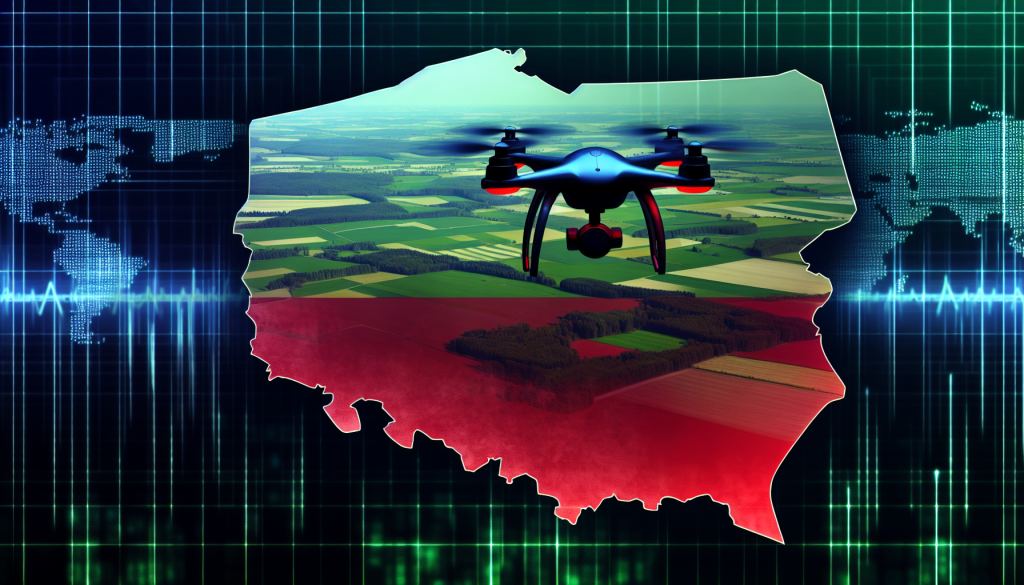Rising Tensions in Europe: Russia’s Drone Incursion into Poland
WARSAW, Poland (AP) — Recently, European leaders have expressed profound concern regarding increasing Russian hostility, particularly following incidents related to Moscow’s ongoing invasion of Ukraine. Tensions escalated dramatically when multiple Russian drones struck Polish territory, marking a dangerous turning point in the conflict.
A Provocative Act
The drone incursion into Poland, coinciding with relentless Russian strikes on Ukraine, has ignited longstanding fears that the ongoing war could spill over into a more extensive regional conflict. The Hlinka separation has intensified calls for a solid and unified response among NATO members, highlighting a growing apprehension over their airspace’s security.
Leadership Responses
British Prime Minister Keir Starmer and French President Emmanuel Macron, alongside German Chancellor Friedrich Merz, discussed the implications of the drone strikes. They articulated the viewpoint that these actions were deliberate provocations by Russia, forcing NATO to re-evaluate its military posture and response capabilities.
Starmer’s office acknowledged that Russia is escalating its aggression with what appears to be a systematic campaign of increasingly hostile actions. The German government also emphasized its commitment to extend and enhance air policing over Poland. NATO’s supreme commander in Europe, U.S. Gen. Alexus Grynkewich, pointed out the uncertainty surrounding the drone entries, remarking on the alliance’s necessity to learn and adapt from this incident.
Escalating Military Concerns
A joint statement from the foreign ministers of Ukraine, Poland, and Lithuania labeled the drone evasion as “an unprecedented provocation,” intensifying concerns over regional stability. Finnish President Alexander Stubb underscored the blurring line between war and peace, likening the situation to the aftermath of Russia’s illegal annexation of Crimea in 2014.
Poland’s Defiant Stance
In a show of resolve, Polish Prime Minister Donald Tusk addressed troops at a central air base, commending the quick military response. Tusk affirmed his commitment to a comprehensive modernization program for Polish military forces, which includes plans to receive advanced F-35 fighter jets from the United States within the year.
Polish President Karol Nawrocki also asserted that Poland “doesn’t get scared by Russian drones,” framing the incident as a test of Poland’s abilities to respond effectively.
National Security Measures
In light of the incursion, the Polish Air Navigation Agency has implemented air traffic restrictions in Eastern Poland for security reasons. Authorities indicated that some drones had likely originated from Belarus, where Russian and Belarusian forces are currently conducting military exercises.
Simultaneously, Poland has announced the closure of its border with Belarus in anticipation of the upcoming war games, highlighting the precarious situation in the region.
Global Response and Implications
Internationally, the incursion reverberates beyond Europe’s borders. As reported, China has urged Poland to maintain open sections of its border with Belarus for strategic freight routes involved in the Belt and Road Initiative. This underscores the intertwined nature of global politics, commerce, and security as the war continues to redefine relationships across Europe and beyond.
In an analysis from the European Council on Foreign Relations, it was posited that Russian President Vladimir Putin is testing European resolve, with the perception that inconsistencies in responses have diminished Europe’s credibility against Russia’s maneuvers.
Former U.S. President Donald Trump also weighed in on the situation, expressing concern over the violation of Polish airspace, potentially foreseeing ramifications that could affect NATO and U.S. military presence in Europe.
Ongoing Warfare in Ukraine
Despite Poland’s heightened tensions, the conflict remains intensely focused within Ukraine. The Ukrainian military recently reported intercepting 62 out of 66 Russian drones, showcasing an ongoing battle of technological warfare. Agreements are being drawn between Ukraine and the United Kingdom to produce advanced interceptor drones, underpinning the urgency to develop sophisticated countermeasures against the continued Russian aggression.
Conclusion Without Closure
As Europe grapples with the implications of Russia’s actions, all eyes remain on the unfolding situation in Ukraine and the potential ramifications for NATO and global security frameworks. The evolving landscape continues to present challenges that require unwavering unity and strategic foresight among allied nations. The consequences of this critical moment in history are yet to be fully realized, but one thing is clear: the stakes have never been higher.

